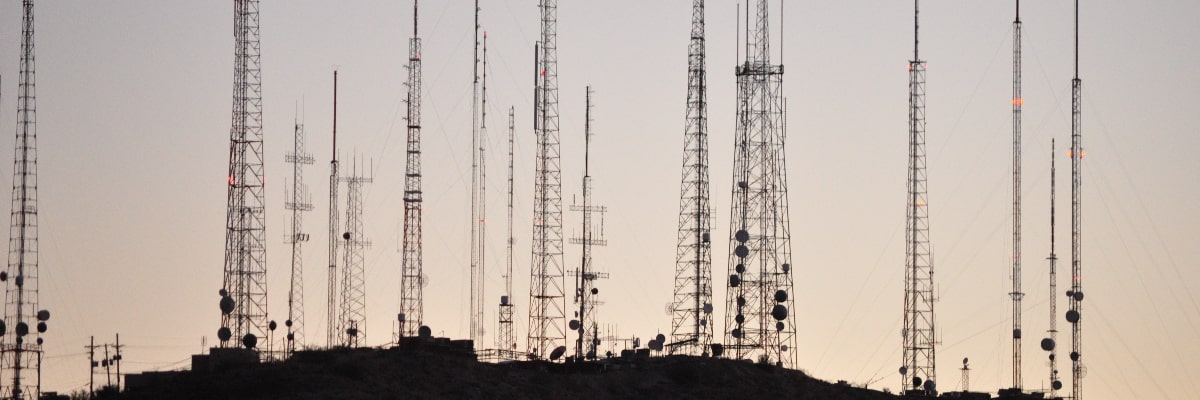Inspired for an Adventure? Check out Beef Stroganoff - Pouch and Beef Stew - Pouch
Free Ground Shipping On All Orders
Over 2,100 Reviews
Add description, images, menus and links to your mega menu
A column with no settings can be used as a spacer
Link to your collections, sales and even external links
Add up to five columns
Add description, images, menus and links to your mega menu
A column with no settings can be used as a spacer
Link to your collections, sales and even external links
Add up to five columns


Amateur radio, aka ham radio, has long been a popular pastime and even an obsession for a huge cross-section of people. Ham radio operators can be found all over the world (often talking to each other!), and the United States alone boasts hundreds and hundreds of amateur radio clubs.
Both a hobby and, in some emergency situations, a public service, ham radio might seem too technical or expensive to get started. Thankfully, that is not the case. It’s easy to test the waters without shelling out a lot of money or filling up a room full of gadgetry, and there are many resources out there to help—not least those offered by the American Radio Relay League (ARRL), the national amateur radio association in the U.S.
To operate ham radio in the U.S., you need an official license from the Federal Communications Commission (FCC). From joining the ham radio community to taking the licensing exam, we’ll explore how to get a ham radio license.
Why Try Ham Radio?
Amateur radio, first of all, can be pretty fun. Ham radio operators can chat with one another around the globe, touch base with astronauts, transmit data, and play around with “Moon bouncing”—Earth-Moon-Earth (EME) communication, which involves reflecting radio signals off the Moon back to our planet. Amateur radio clubs and events such as ham radio competitions link enthusiasts with one another.

Photo by idono on Freeimages.com
Fun indeed—and an accessible, intimate way to connect with other people. But ham radio can also play a critical role during natural disasters and other emergencies when other lines of normal communication may be down. It’s partly because of that very real usefulness—and the opportunities for positive international connections—that the International Telecommunication Union (and the FFC) reserves 26 radio frequencies for amateur use—the Amateur Bands, between 1.8 Megahertz (MHz) and 275 Gigahertz (GHz)—and established its licensing system.
Understanding Ham Radio Licensing
To avoid interference with other radio communications and manage amateur use, the FCC requires ham operators to obtain a license. How hard is it to get a ham radio license? With the right study and preparation, it’s realistically attainable for just about anyone, and you’ve got multiple levels of certification to shoot for depending on the depth of your interest.
There are three current FCC ham radio license classes: Technician, General, and Amateur Extra. (It’s worth noting three other grandfathered amateur radio operator classes recognized by the FCC: Novice, Technician Plus, and Advanced.)
These classes run the gamut from the entry-level Technician license to the advanced Amateur Extra. You obtain the licenses by passing examinations, which, unsurprisingly, get tougher for the more advanced levels. The multiple-choice exams are 35 questions each for the Technician and General licenses, while the Amateur Extra is a 50-question test. You need a score of at least 74% to pass these exams.
These licenses are good for 10 years, after which you’ll need to renew yours.
Technician License
The entry-level ham radio license affords you privilege to all of the VHF (Very High Frequency)/UHF (Ultra High Frequency) Amateur Bands, those above 30 MHz. This includes the fabled 2-meter band (144 to 148 MHz) so beloved by “hams.” Your Technician class license also opens up a bit of the HF (High Frequency) spectrum as well.
General Class License
The General license lets you use all of the Amateur Radio bands and operating modes and gives you privileges for most of the HF bands (10 through 160 meters) that open up global communication and expand your usefulness regarding emergency communications.
Amateur Extra License
The Amateur Extra license gives the serious ham operator “all available U.S. Amateur Radio operating privileges on all bands and modes,” as the ARRL notes. It’s the premier amateur license that the FCC issues.
Preparing for the License Exam
There are loads of handy references and other resources out there to help you prepare for the FCC amateur radio operator license exams. The website of the ARRL is full of useful information, including the ARRL Ham Radio License Manual and the current Question Pools used for each license class exam. That’s right, you can have a look at all the questions that will be on the exams in advance. Each Question Pool contains at least 10 times the number of questions that appear on the tests themselves. Make sure you’re studying the current Question Pool for the given license class exam!
There are plenty of other websites (such as hamstudy.org) as well as books useful for exam prep, plus online classes. It’s easy to find practice exams to take, and we highly recommend them to prepare you for the real deal!
Morse Code
The history of amateur radio is closely entwined with the nearly 200-year-old dots-and-dashes communication system of Morse code. Many ham enthusiasts still enjoy transmitting messages in Morse code, not least because it transcends language barriers and, for those well-versed in it, is an extremely fast and efficient way to communicate.
Proficiency in Morse code was at one point a requirement for getting licensed in amateur radio operations, but that is no longer the case. None of the FCC license class exams, including the Amateur Extra level, have a Morse code test. That said, you may want to give learning this communication system a try, given its great utility and widespread use in ham radio.
Taking the Exam
Amateur radio license exams are available both in person and online. The exams are overseen by an FCC-approved Volunteer Examiner Coordinator (VEC), who also sets the exam fee (normally in the vicinity of $15 or less), and administered by Volunteer Examiners (VEs).
Before taking an exam, you need to register in the FCC CORES system and obtain your FCC Registration Number (FRN). Bring a legal photo ID—a state driver’s license, for example, or a government-issued passport—or two forms of non-photo ID, such as your birth certificate or Social Security card, to the exam.
After Passing the Exam
How long does it take to get a ham radio license? Once you’ve successfully passed your exam, you’ll receive your license—plus a unique call sign from the FCC—usually a week or two after the test. With license and call sign in hand (so to speak), you’re ready to operate! Consider joining an amateur radio club and participating in the many online forums as you continue your ham radio journey. These are great sources of ongoing support and learning.
Prepare for Any Emergency Situation
Many people get involved with ham radio, at least partly, to be of potential use during emergencies. Here at Mountain House, we’ve long assisted with emergency preparation on the home front with our freeze-dried meals and provisions, ideal for putting together your at-home preparedness kit. Explore our collection of emergency and survival food today!

How to Rotate Emergency Food: FIFO and Other Rotation Methods

The First 72 Is on You: Survival Kit Checklist + Printable PDF


Stay Hungry for Adventure
Sign Up for Delicious Outdoor Meals & Exclusive Offers!
By clicking ‘Join Now’, I agree to the Terms of Service and Privacy Policy.


Join the adventure
©2026 Mountain House — All Rights Reserved.
Your Cart is Empty
Continue ShoppingYour Cart
Subtotal
$0.00
EXPRESS PAYMENT METHODS AVAILABLE IN CHECKOUT
Taxes and Shipping Calculated at Checkout
Your ExpertVoice deal.
$[Deal Price]
$[Original Price]
Discount applied at checkout.
On sale now — lower than your ExpertVoice discount.
Not eligible for ExpertVoice discount.














